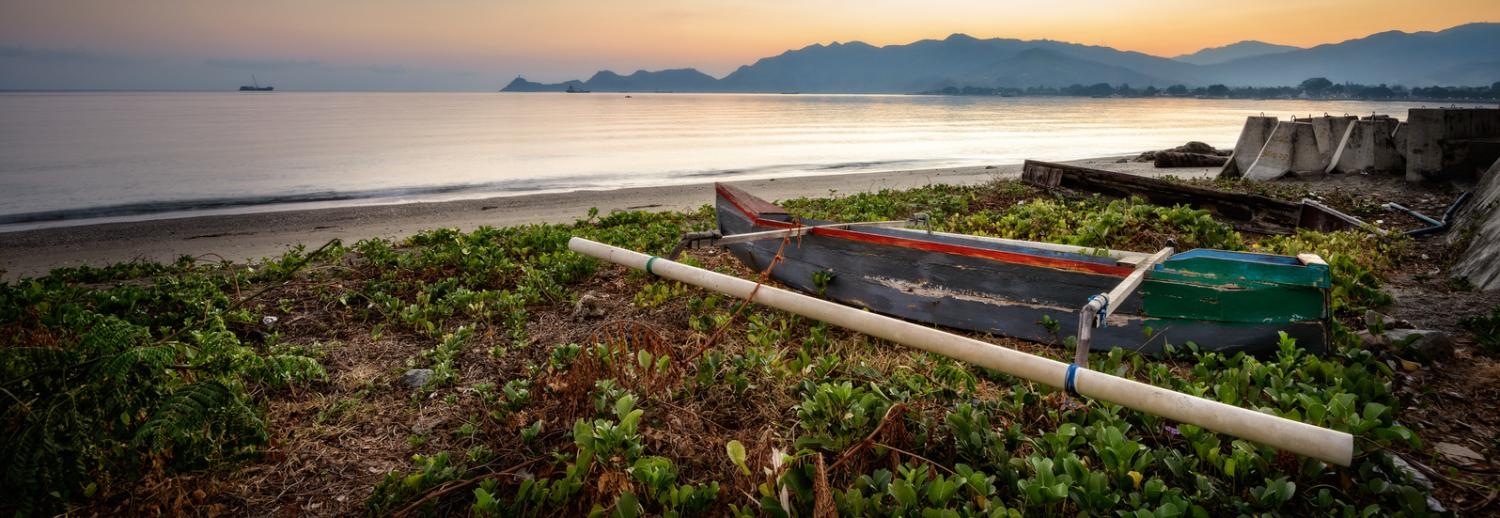There has always been something of a ghost-like quality to languorous Dili, capital of Timor-Leste with its Portuguese-era buildings and statues from Indonesian times still standing.
Nowadays, it feels that there are new ghosts in the city: imprints of a once prominent international presence slipping from perceptible view. Between 1999-2012, the country was home to military peacekeepers, police from more than 50 nations, a legion of non-governmental organisations, an alphabet soup of programs, and enough characters to fill a shelf of Graham Greene novels.
The marks of this mammoth international inflow are still visible if you know where to look.

Take a nondescript compound with fading blue and white colouring on the outside walls. This is Obrigado Barracks, home to the last three of five UN missions that operated in the country from 1999-2012, a clamour of four-by-four vehicles and people wearing lanyards walking purposefully. Obrigado still houses the pared-down UN country team but the complex felt eerie in its quiet in the late December day I visited.
The sense of Dili as the setting for some grand international state-building project is reduced.
Development of the East Timorese police was a large component of the UN’s work. Some 15,000 or so UN police would have rotated through the country in those 13 years. Vehicular reminders of their presence are everywhere. Many of the cars in the current police fleet are UN hand-me-downs while the parking lots of many stations have a rusted chassis or two.
Close by Obrigado barracks is an empty two-storey white building with overgrown grounds that was once another hubbub of can-do energy. That was the headquarters of the Australian-New Zealand International Stabilisation Force 2006-2012. The only real clue to its former role is a small yellow sign pointing to where visitors needed to discharge loaded weapons. The East Timorese defence forces occupy many of the other bases.
Some of the eateries and bars that fed and watered the massive international presence have shuttered. Down on the waterfront is a derelict building where was once the Dili Beach Hotel, a little bit of sweaty Australiana with wood-fired pizzas, scuffed pool tables, footy on the big screen, and wobbling technical advisers. Gone too are the little Burmese place, dear old Café Brazil by the parliament, and the Tropical Bakery, just across from Obrigado barracks that effectively served as the missions’ parlour room and setting for many a solemn meeting over ham and cheese croissants.

There is still substantial international support to Timor-Leste. Australia will provide more than $90 million in overseas development assistance in 2018-19. Portugal, the European Union, and the United Nations continue to provide decent-sized support also. Many NGO’s remain, doing valuable and un-showy work. But the sense of Dili as the setting for some grand international state-building project is reduced.
Despite doom-mongering in expat hangouts at the tail-end of the peacekeeping mission that the economy – and even stability itself – would be endangered once the large international presence departed this has not occurred. If anything, the city has been given a chance to breathe. “Timor-Leste is becoming more of an Asian country”, says Fidelis Magalhaes, Minister for Legal Reforms and Parliamentary Affairs, “more Asian than it was ten years ago.” The Timorese see their future as part of ASEAN. In Dili there is very much a sense of a small, boisterous country getting on with it, dire short-medium term economic outlook bedamned.
I made a point of asking East Timorese I met about the legacies of this international presence. While I wasn’t expecting references to specific management training, memorable PowerPoint presentations, or recitation of technocratic results envisioned in development assistance frameworks, the answers surprised me all the same.
“So many ‘days’” groaned Cesario, our taxi driver who ferried my family and I around Dili in the week we visited. Human Rights Day, International Anti-Corruption Day, World Water Day: all of which needed to be celebrated with a banner and event.
Those working in the government cited the international presence as enabling a circulation and through-fare of ideas from which to pick and choose, to take on and disregard. Study trips – the component of international assistance most easy to eye-roll about– were cited frequently as enabling an understanding of the size and importance of Timor-Leste relative to elsewhere in the world. Politicians and public servants who travelled in Asia became acutely aware of how small their country was in comparison.
Conversely, police officials visiting the Pacific had the opposite feeling when lining up the size of their police services vis-à-vis a Nauru or Cook Islands. For Magalhaes, a major legacy is “an openness to the world … there is a sense that Timorese leaders … have to live up to the expectations of the international community.”
Hard to mark down realisations, senses and feelings as concrete achievements, but they are marks and legacies all the same.

